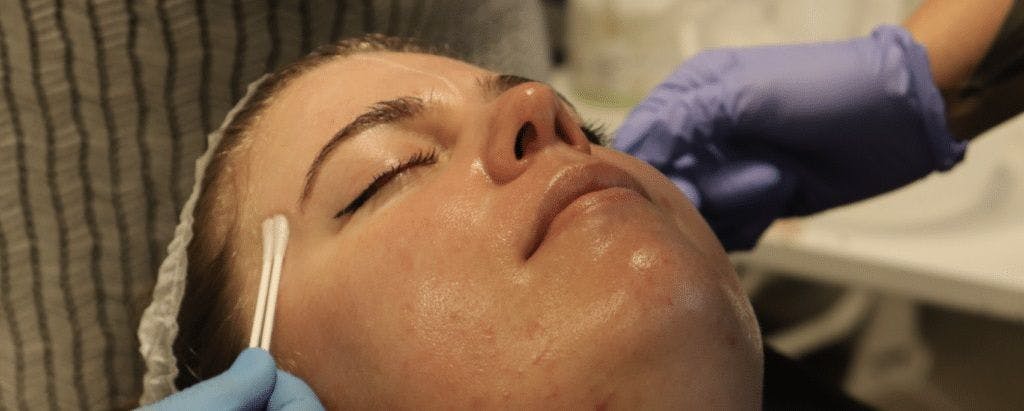Acne Management For Aesthetics Practitioners

Acne is a common skin concern that, as aesthetics practitioners, we see frequently.
As such, dental professional with dedicated experience in 'skin first' aesthetics, Dr Raquel Amado has provided this full run down to help you better understand acne management.
With June being Acne Awareness Month, we felt there was no better time to share this information every aesthetics practitioner should know...

What is acne and how is it treated?
Acne is a common chronic inflammatory skin condition that involves the dysfunction of the pilosebaceous unit (hair follicles and oil glands). It is managed by reducing oil production, speeding up skin cell turnover, treating bacterial infection and reducing inflammation. This ultimately helps the goal to prevent scarring.
Elements that interrupt the physiological processes of acne include:
- Antibiotics to reduce counts of Cutibacterium acnes bacteria.
- Anti-inflammatory ingredients to calm red and inflamed skin.
- Comedolytics to unplug blocked follicles.
- Keratolytic agents to exfoliate the surface scaling.
- Agents that affect keratinisation to help normalise skin cell maturation.
- Hormonal therapy to reduce androgen activity like sebum production.
The three main types of acne management
Acne management usually involves a combination of approaches. The three main options are topical applications, oral medication and clinical skin treatments.
Topical acne treatments
Retinoids encourage exfoliating of the skin, keeping pores unclogged and preventing comedones.
Salicylic acid is a keratolytic. By softening keratin, it takes off the upper layer of skin. As well as unclogging pores, it breaks down whiteheads and blackheads. It also allows additional topical products to penetrate the skin better.
Azelaic acid – as an antibacterial, keratolytic and comedolytic, it reduces Cutibacterium acnes and Staphylococcus epidermis on the skin. It also helps normalize the shedding of dead skin cells and decreases inflammation by scavenging free radicals. Azelaic acid also importantly improves post-inflammatory hyperpigmentation.
Benzoyl peroxide reduces the number of bacteria on the surface of the skin without causing bacterial resistance. It also has an anti-inflammatory effect. As an oxidizing agent, it is keratolytic and comedolytic. It also has an anti-inflammatory action.
Topical antibiotics such as clindamycin or erythromycin, improve acne by stopping the growth of acne-causing bacteria. They also help reduce inflammation and are thought to decrease the amount of blocked pores.
Nicotinamide may improve acne through its anti-inflammatory action and by reducing sebum production.
Oral acne treatments
Oral antibiotics such as macrolides (eg. erythromycin) or tetracyclines (eg. doxycycline), are the most common antibiotics prescribed. They act by reducing bacterial colonisation and inflammation in the affected follicles, but they do not cure acne. Interestingly, they are less associated with bacterial resistance compared to topical antibiotic preparations. They can be used for short periods of time, up to 6 months.
Oral contraceptive pills are a hormonal intervention that reduce androgen activity. This helps with the reduction of sebum production. Consequently, there is less follicle obstruction and the medium for bacterial growth is reduced. It is a more medium-term treatment and can take up to 6 months to see results. This treatment comes with associated side effects and should be considered with the patient’s GP.
Isotretinoin (dermatologists only) is a drug that can help to effectively suppress severe acne for as long as two years. It is the only therapy that impacts all of the major acne-causing factors. It results in a reduction of sebum production, reduces comedogenesis, lowers surface and ductal P. acnes and has anti-inflammatory properties. However, it has several severe side effects including depression and liver/kidney problems. It can cause birth defects, which means patients should not become pregnant while taking it. The treatment lasts between 4 to 6 months and it can cause severe dryness of the skin. Most skin actives and in-clinic skin treatments cannot be used with patients taking this potent medication.
Spironolactone (dermatologists only) can be used off-licence as it can also have hormonal effects by blocking the action of androgens.

Clinical skin treatments for acne
Chemical peels will promote exfoliation of the skin using ingredients such as salicylic acid, glycolic acid or retinoic acid.
UV light therapy may help as it has an antimicrobial and an anti-inflammatory effect which promotes skin healing.
Microneedling can be effective for acne scarring due to its induction of collagen production.
Know your limits
Managing acne can be challenging, so it’s important to know your limits, referring appropriately in severe or resistant cases. Due to the psychological impact this condition can have on an individual, the rewards of managing acne well can be profound, as long as realistic expectations are discussed. It takes time, patience and effort from the patient and practitioner alike!
Learn to manage acne for your patients
Acne is such a common skin concern that, as an aesthetic practitioner, you're more than likely to come across it. Being able to treat this cohort can be incredibly rewarding for you, as well as your patients, given the toll this condition can have on their general wellbeing.
If you'd like to be able to identify the different types of acne and learn how to treat the forms which don't require a specialist dermatology referral, we've got you.
The Harley Academy Cosmetic Dermatology Course offers the opportunity to learn about a number of common skin conditions, including acne. During your eLearning, you'll learn how to identify specific complaints and the appropriate management pathways to consider. You'll find out what treatments and ingredients are best-suited in these situations, and which to avoid.
Your clinical training, from your Foundation Training in Cosmetic Dermatology through to your dedicated practical sessions, will build on this knowledge. You'll learn how to safely and confidently administer a range of popular skin treatments, including chemical peels, skin boosters, polynucleotides and microneedling - which can be great for cases of acne scarring.
Furthermore, you'll learn how to form integrated, multi-modal treatment plans for a holistic approach to acne management, as well as any post-treatment issues such as hyperpigmentation or scarring. By immersing yourself in the theory of cosmetic dermatology, then growing and enhancing this knowledge, fleshed out through hands-on clinical training, you'll become confident in delivering effective treatment plans that bring results you can be proud of.
Available as a standalone course or as part of the Level 7+
Our Cosmetic Dermatology Course can be taken on its own or as part of our combined Level 7 Diploma programme, the Level 7+. This includes our Ofqual-regulated, JCCP-approved botox and filler course, the Level 7 Diploma in Cosmetic Injectables.
Our Level 7+ pathway offers our premier route into becoming an holistic aesthetic practitioner, with a broader, more commercially sound appeal. After all, even patients who aren't interested in injectables may want skin treatments. Conversely, those who already enjoy injectables may see better results from a double faceted approach that helps to improve their skin quality.
For more information on any of these cosmetic dermatology training options, or if you'd like to explore the best aesthetics course for you, based on your specific needs, do let us know. You can book a call with our dedicated team, who've advised thousands of healthcare professionals, like you, on how to introduce aesthetics to their medical skillset. No question is a silly question, so feel free to ask away!
All information correct at time of publication
Download our full prospectus
Browse all our injectables, dermal fillers and cosmetic dermatology courses in one document
By submitting this form, you agree to receive marketing about our products, events, promotions and exclusive content. Consent is not a condition of purchase, and no purchase is necessary. Message frequency varies. View our Privacy Policy and Terms & Conditions
Attend our FREE open evening
If you're not sure which course is right for you, let us help
Join us online or in-person at our free open evening to learn more
Our Partners













STAY INFORMED
Sign up to receive industry news, careers advice, special offers and information on Harley Academy courses and services


